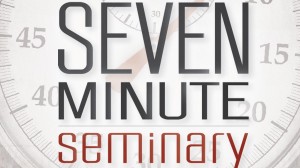
John Wesley’s View of the Image of God
What follows is a summary of John Wesley’s theology of the imago dei (Gen. 1:26–27).



What follows is a summary of John Wesley’s theology of the imago dei (Gen. 1:26–27).

He may not come when you want Him, but He’ll be there right on time. Ann Coker proclaims that our God is an on-time God.

The Bible reminds us that God is good, he created a good world, and that he loves us. Beyond this, our experience with pain and suffering largely remains a mystery. There are, however, common myths that should be dispelled. Watch this Seven Minute Seminary from Carolyn Moore to learn more about a biblical theology of suffering.

What is the strongest answer Wesleyan Arminianism has for 5-Point Calvinism? David Hatton explains his journey of understanding both doctrinal stances and calls for a better understanding of our strongest argument: Prevenient Grace.

What’s so important about cultural discernment? In today’s article, Benjamin Videtich sensitively works through two common approaches related to cultural engagement. Both are expressed by Jesus in his own life and ministry, but usually Christians will resonate with one over the other.

Brian Shelton realized that gaining clarity when it comes to predestination and free will is to be found not in the synthesis of these two doctrines, but in their separation. Read about his journey into exploring the biblical foundation for prevenient grace.

We are pleased to team up with Roger E. Olson to offer you this free ebook: Arminianism FAQ: Everything You Always Wanted to Know. Roger is a leading voice on the issues surrounding the biblical understanding of salvation and has spent the last few years of his life bringing clarity to this discussion.

Beginning in the early days of the Methodist Revival, John Wesley’s position on predestination became a controversial issue. His friend and partner in ministry George Whitefield was a staunch Calvinist, which meant that he believed